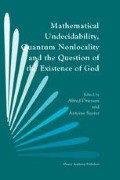Abstract
In 1988 Stephen Hawking, a mathematician and physicist, published a book1 for the broader public, which soon after appearance became a best-seller. It was translated in more than 20 languages and, in parallel, a series of extended interviews were asked and given for important newspapers and magazines in many countries. Meanwhile more than 8 years have passed, and several studies have dealt with the physical2 and philosophical3-5 aspects treated in this book. In the following, a outline of the book and an analysis of the philosophical elements is given in the light of the metaphysics of Aristotle and Aquinas. The focus hereby is laid on the aspects relevant to the question of the existence of God.
Access this chapter
Tax calculation will be finalised at checkout
Purchases are for personal use only
Preview
Unable to display preview. Download preview PDF.
Notes
S. Hawking, A Brief History of Time, from the Big Bang to Black Holes, Bantam Books, New York, 1988.
M. Sachs, “On Hawking’s ‘A Brief History of Time’ and the Present State of Physics”, Brit. J. Phil Sci. 44(3), pp. 543–547, 1993.
W.L. Craig, “‘What Place, Then, for a Creator?’: Hawking on God and Creation”, Brit. J. Phil. Sci. 41, pp. 473–491, 1990.
R.J. Deltete, “Hawking on God and Creation”, Zygon 28(4), pp. 485–506, 1994.
A. Driessen, “The Question of the Existence of God in the Book of Stephen Hawking ‘A Brief History of Time’”, Acta Philosphica 4, pp. 83–93, 1995.
Hawking, p. x.
Ibid., p.7.
Ibid., p.9.
Ibid., p. 11.
Ibid., p. 13.
Ibid., p. 34.
Ibid., p. 61.
Ibid., p. 53.
Ibid., p. 74.
Ibid., p. 122.
Ibid., p. 122.
The anthropic principle has been introduced by Hawking and B. Carter, and can be summarized: “we see the universe the way it is because we exist”.
Hawking, p. 136.
There is a certain similarity with the Gödel universe, where the past and the future is a loop, see K. Godel, Collected Works, Vol. II, Publications 1938-1974, pp. 189-216, ed. by S. Feferman et al., Oxford University Press, New York, 1990.
Hawking, p. 140.
Ibid, p. 140f.
Ibid., p. 136.
Ex. 3,15.
Hawking, p. 168.
Ibid., p. 169.
Ibid., p. 173.
Ibid., p. 174.
Ibid., p. 174.
Ibid., p. 174.
Ibid., p. 175.
Thomas Aquinas, Summa Theologiae, I, q.2, a.3.
For the interested reader an English translation of the first way is given below (from St. Thomas Aquinas, Summa Theologiae, Latin text and English translation, translated by T. McDermott O.P., Blackfriars and Eyre & Spottiswoode, London, 1964). In contrast to our quotations in the text, which follow closely the Latin of Aquinas, this translation uses more the concepts of today’s English. The main difference is the translation of moveri, being moved, which is translated as being in process of change. The first and most obvious way is based on change (ex parte motus). Some things in the world are certainly in process of change: this we plainly see. Now anything in process of change is being changed by something else. This is so because it is characteristic to things in process of change that they do not have the perfection towards which they move, though able to have it; whereas it is characteristic of something causing change to have that perfection already. For to cause change is to bring into being what was previously only able to be, and this can only be done by something that already is: thus fire, which is actually hot, causes wood, which is able to be hot, to become actually hot, and in this way causes changes in the wood. Now the same thing cannot at the same time be both actually x and potentially x, though it can be actually x and potentially y: the actually hot cannot at the same time be potentially hot, though it can be potentially cold. Consequently, a thing in process of change cannot itself cause that same change; it cannot change itself. Of necessity therefore anything in process of change is being changed by something else. Moreover, this something else, if in process of change, is itself being changed by yet another thing; and this last by another. Now we must stop somewhere, otherwise there will be no first cause of the change, and, as a result, no subsequent causes. For it is only when acted upon by the first cause that the intermediate causes will produce the change: if the hand does not move the stick, the stick will not move anything else. Hence one is bound to arrive at some first cause of change not itself being changed by anything, and this is what everybody understands by God.
Plato, Phaedrus.
Aristotle, Physica VIII.
A. Driessen and A. Suarez, “Introduction”, this volume, pp. xi–xv.
Hawking, p. 7.
This corresponds also to the Kantian view of causality (see A. Driessen and A. Suarez, “Introduction”, this volume, pp. xi-xv, and A. Suarez, “Nonlocal Phenomena”, this volume, pp. 143-171). L. Elders, De Metafysica van St. Thomas van Aquino in historisch perspectief, II: Filosofische godsleer, p. 150, Uitgeverij Tabor, Brugge, 1987; see also Thomas Aquinas, In liber II Physicorum, lectio 6, n. 195.
Hawking, p. 141.
Ibid., p. 174.
Ibid., p. 53.
For a discussion, see, e.g. L.J. Elders, De natuurfilosofie van Sint Thomas van Aquino, pp. 138ff., Uitgeverij Tabor, Brugge, 1990.
In the Jewish-Christian tradition this information is found in Gen. 1.1: In the beginning … Department of Applied Physics University of Twente Enschede, the Netherlands
Author information
Authors and Affiliations
Editor information
Editors and Affiliations
Rights and permissions
Copyright information
© 1997 Springer Science+Business Media Dordrecht
About this chapter
Cite this chapter
Driessen, A. (1997). The Question of the Existence of God in the Book of Stephen Hawking: a Brief History of Time. In: Driessen, A., Suarez, A. (eds) Mathematical Undecidability, Quantum Nonlocality and the Question of the Existence of God. Springer, Dordrecht. https://doi.org/10.1007/978-94-011-5428-4_14
Download citation
DOI: https://doi.org/10.1007/978-94-011-5428-4_14
Publisher Name: Springer, Dordrecht
Print ISBN: 978-94-010-6283-1
Online ISBN: 978-94-011-5428-4
eBook Packages: Springer Book Archive

